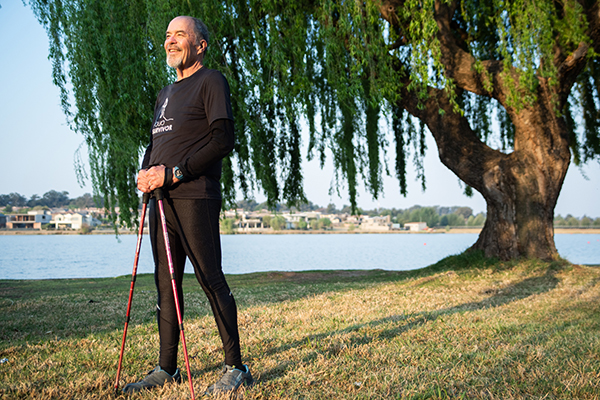
By Div Louw, Rotary Club of Benoni, South Africa
I was a typical, energetic four-year old in South Africa, running around our house with visions of my hero, long distance runner Jan Barnard, in my head when I felt something wrong. I ran inside and told my mother, “I have a dripping tap in my chest.” This was my way of describing what I felt, my heart skipping beats now and again. My mom, Christine, pressed an ear to my chest and called our general practitioner.
That would be the last day I would run imaginary races with Barnard. I had contracted spino-bulbar polio, which destroys neurons in the brainstem causing respiratory or cardiac failure. I was given less than a 2% chance of survival. This was in 1955, during a polio epidemic in South Africa, months before the Salk Vaccine was declared safe and effective.
I spent the next six months in isolation, staring at my parents through the window of an isolation ward. They would bring me beautiful presents, but I never got them. I thought the nurses had stolen them, and because I was paralyzed, I could not help myself. Later, I realized I had a room full of gifts back at home.
When I was discharged, the doctors were of the opinion I should undergo surgery, and that I should be put into casts and spend six months in recovery. They gave me very little chance of not being crippled. My Dad had a different opinion. He bought me a Fire Brigade (a bright red toy riding truck), and offered me a choice.
“Son, you can either go into the hospital and get leg calipers and hope you can be able to walk again or you can take this (toy truck) and do what you do best.”
That was the trigger for everything that followed. I loved that Fire Brigade. We became inseparable and it became my substitute legs. I eventually graduated to a bicycle and spent a lot of time getting up and dusting myself off. Then I learned to swim in the warm waters of a spa resort during family holidays, exuberantly applying my new-found unrestricted activity.
And something amazing happened. My broken body adapted. Nerves sprouted detours, surrounding muscles took over functionality of paralyzed ones. I almost looked and functioned normally. Almost.
It was at university when I dared train around other athletes that a passion rekindled to be a real athlete. I learned to play squash and joined some low-rated team rugby games. After college, I continued to play squash somewhat seriously.
But polio never really leaves you. During training for a league game, I once again became aware of my famous childhood foe. My heart skipped beats, I developed twitches and tremors. Once more in the Pretoria hospital, Professor Ben Lotz and his clinical assistant delivered dreadful news, the affects of polio had returned, I was suffering from what many know as postpolio syndrome. I was advised that I would soon be immobile, and my family was cautioned I may spend the rest of life in a wheelchair.
I did the only thing I knew how, I remained mobile and active.
In 2018, I saw a neurologist for a routine exam including an MRI and brain scan, and he once more expressed surprise that I was still walking. I took the news seriously, and prepared for possible immobility, shedding excess weight.
I started exercising. Walking. Then cycling. And finally, I returned to my favorite activity, swimming.
At the age of 70, I discovered para sport and became a triathlete. I was classified PTS-3 and after acquiring some regional medals, received gold in my category at the Africa Triathlon Championships in Sharm El Sheikh, Egypt, in 2021. I am now training to compete in Morocco at the championships 24-25 September, with a goal of under two hours to earn ranking for Paralympic participation.
I saw something in Egypt that moved me to want to advocate for these amazing para-athletes. They are responsible for every aspect of their own participation. They make all their own arrangements and cover all expenses, down to the last dime. They compete for the sake of the challenge, the thrill of achieving the impossible. While they could always use financial support, they deserve an accolade for their tenacity at the finish line.
I also knew I wanted to advocate for ending polio. But I knew I needed allies to do so. I searched the Internet and discovered that Rotary has been committed to eradicating polio for decades. Heeding the advice of a friend and member of the Rotary Club of Benoni, Annie Steijn, I attended a postpolio syndrome advocacy group. In July, I joined the club, and became one of its newest advocates for End Polio Now.
The intensity of my plea comes from experience. When I hear about resistance to vaccinations, and read about polio being detected in places including Europe, I want to tell people: Don’t let this happen to you. It must not. It cannot. Vaccines work. If I had a choice, I would have taken the vaccine.
The Rotary Club of Benoni and the District 9400 PolioPlus committee have started a Back-A-Buddy campaign to support my training with all proceeds going to Rotary’s PolioPlus Fund. See my Facebook page or contact grace@gracevanzyl.com for more information.
https://blog.rotary.org/2022/09/15/a-polio-survivors-plea-dont-let-this-happen-to-you/
